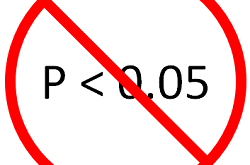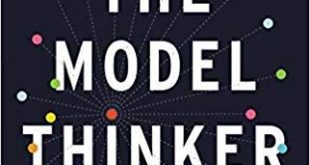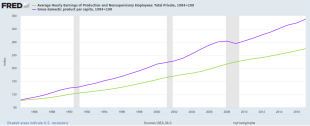from Dean Baker As we reach the end of the year, the economic recovery in the United States is approaching a new record for duration. In June, it will have its tenth birthday, passing the 1990s recovery as the longest one in US history. While recoveries do not die of old age, they do die. The length of this recovery has many looking for recession prospects on the horizon. At the moment, they are not clearly visible. Before examining the risks, it is worth saying a bit about the good news....
Read More »Open thread Dec. 21, 2018
Why statistical significance is worthless in science
from Lars Syll There are at least around 20 or so common misunderstandings and abuses of p-values and NHST [Null Hypothesis Significance Testing]. Most of them are related to the definition of p-value … Other misunderstandings are about the implications of statistical significance. Statistical significance does not me an substantive significance: just because an observation (or a more extreme observation) was unlikely had there been no differences in the population does not mean that the...
Read More »Ivy Leagues are handing out millions in fees to hedge fund managers
from Dean Baker Many of the richest people in the country make their fortune in the financial sector. While it is surely the case that many of the high rollers in the financial sector are hard working and intelligent, these traits are not the key to getting really rich in the modern economy. As has always been the case, nothing can beat being well connected. The latest tale of the well-connected rich is a study, by Markov Processes International, of the 10-year returns of the endowments...
Read More »Open thread Dec.19, 2018
Why all models are wrong
from Lars Syll Models share three common characteristics: First, they simplify, stripping away unnecessary details, abstracting from reality, or creating anew from whole cloth. Second, they formalize, making precise definitions. Models use mathematics, not words … Models create structures within which we can think logically … But the logic comes at a cost, which leads to their third characteristic: all models are wrong … Models are wrong because they simplify. They omit details. By...
Read More »Measure for measure*
from David Ruccio No matter how we measure it, most Americans are falling further and further behind the tiny group at the top. That’s not at all surprising. Whether we compare the growing gap between average wages and Gross Domestic Product per capita (as in the chart on the left) or real median household income and real Gross Domestic Product per capita (as in the chart on the right), it’s clear the average American has been losing out. A growing proportion of what workers produce...
Read More »Gr**th and G*P: don’t mention the G-Words
from Geoff Davies The recent exchange between Jason Hickel (and here and here) and Dean Baker (and here) on whether humanity can have a viable future and still have ‘economic growth’, nicely highlights the way old concepts and words can trap us in unproductive debate and action. The way forward is to recognise the need for a fundamental re-framing of the nature and purpose of our societies, and their economies. The terms growth, GDP, capital and capitalism are so ill-defined, confused or...
Read More »“Wageless growth” not “Jobless growth” the new conundrum
from C. P. Chandrasekhar The so-called ‘synchronised recovery’ that global policy makers periodically refer to, seems to have bypassed much of the world’s working people. According to the just released Global Wage Report 2018/19 of the International Labour Organisation (ILO), the rate of growth of average monthly earnings adjusted for inflation of workers across 136 countries registered in 2017 its lowest growth since crisis year 2008, and was well below figures recorded in the pre-crisis...
Read More »Disconfirming rational expectations
from Lars Syll Empirical efforts at testing the correctness of the rational expectations hypothesis have resulted in a series of empirical studies that have more or less concluded that it is not consistent with the facts. In one of the more well-known and highly respected evaluation reviews made, Michael Lovell (1986) concluded: it seems to me that the weight of empirical evidence is sufficiently strong to compel us to suspend belief in the hypothesis of rational expectations, pending the...
Read More » Heterodox
Heterodox




